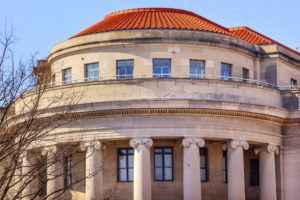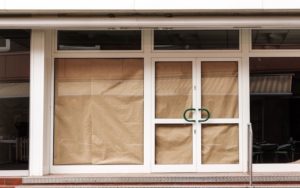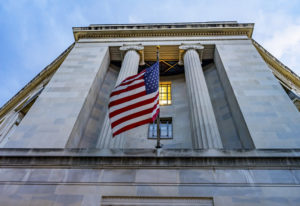
The Supreme Court allows expedited deportation orders for asylum seekers, U.S. Attorney General for the Southern District of New York resigns, and more…
IN THE NEWS
- In a 7-2 decision, the U.S. Supreme Court held that limits on habeas review for asylum seekers subject to expedited removal does not violate the U.S. Constitution’s Suspension Clause or Due Process Clause. The case concerned plaintiff Vijayakumar Thuraissigiam, whose asylum claim failed at three levels of administrative review. Thuraissigiam then filed a habeas corpus petition in federal court to challenge the removal decision. The Supreme Court ruled that the Suspension Clause applies when a person is confined by the government and not to judicial review of a deportation decision. The Court also held that there is appropriate due process when administrative officers act under explicit power granted by Congress. Thuraissigiam’s attorney condemned the decision, asserting that people facing “flawed deportation orders” can now be “forcibly removed with no judicial oversight.” Lawyers for the federal government cautioned that there would be a flood of habeas petitions overburdening the systems if the Court had found otherwise.
- After U.S. Attorney General William Barr announced that Geoffrey Berman, U.S. Attorney for the Southern District of New York, was stepping down, Berman maintained that Barr did not have the authority to remove him from office and he did not intend to step down. Subsequently, Barr wrote Berman to inform him that President Donald J. Trump had officially removed him from office, despite President Trump denying any involvement. The situation spurred a debate about who has the authority to fire a court-appointed U.S. Attorney. Berman ultimately agreed to step down, provided that Audrey Strauss, Deputy U.S. Attorney for the Southern District of New York, would become the acting U.S. Attorney. Berman had reportedly been leading prosecutors who have been investigating individuals close to President Trump, such as Rudy Giuliani.
- The U.S. Department of the Treasury and the U.S. Small Business Administration announced that they will be publicly releasing data showing which businesses received loans greater than $150,000 through the federal Paycheck Protection Program. The public disclosure will include data from nearly 75 percent of all program loan recipients. The announcement followed weeks of pressure from Congress urging the Trump Administration and the Treasury Department to permit greater oversight over the distribution of more than $500 billion in small-business loans. U.S. Senator Marco Rubio (R-Fla.) praised the new loan disclosure agreement as a necessary step in measuring the success of the program by “how many paychecks were protected.”
- The U.S Supreme Court ruled that the Securities and Exchange Commission (SEC) can seize profits acquired illegally through fraudulent companies. The 8-1 decision, written by Justice Sonia Sotomayor, held that the seized profits must benefit the investors and cannot exceed the profits from the wrongdoing. The ruling could also decrease incentives for whistleblowers, who may receive less financial compensation if total monetary penalties are reduced. Justice Clarence Thomas dissented because he found no legal authority for the SEC to seize profits and feared that the process would encourage abuse. Erika Kelton, partner and whistleblower attorney at Phillips & Cohen LLP, reportedly said that, “if the outcome had been otherwise, then it would have had a chilling effect on whistleblowers.”
- President Donald J. Trump issued a proclamation suspending until 2021 the issuance of certain employment-based visas, including visas commonly used in the technology industry and visas meant for executives of large companies. The proclamation comes after prior immigration proclamations addressed the President’s concerns about immigrants allegedly taking American jobs. In announcing the immigration reforms, President Trump cited a “moral duty to create an immigration system that protects the lives and jobs of our citizens.” Leon Fresco, former deputy assistant attorney general, said that “the ban on H-1B visas, which are often used to fill very niche positions that are not easily found in the American workforce, will ultimately prove to be counterproductive and is an example of using a nuclear bomb to address a bar fight.”
- The Kingdom of Saudi Arabia’s Ministry of Hajj and Umrah, the government agency responsible for administering the annual Islamic pilgrimage to Mecca, announced that this year’s hajj would be restricted to a “very limited number of pilgrims” due to the COVID-19 pandemic. The hajj drew 2.5 million pilgrims last year and produces an estimated $8 billion of revenue for the Kingdom each year. Saudi Arabia’s highest council of clerics, the Council of Senior Scholars, reportedly expressed its support for the Kingdom’s decision to limit this year’s hajj as consistent with Sharia law.
- The U.S. Department of State announced that it designated four Chinese media outlets as “foreign missions” under the Foreign Missions Act. The designation will subject the outlets to a heightened level of scrutiny by the State Department comparable to that applied to foreign embassies. This announcement was the latest event in an escalating conflict between the two countries over the press, following five similar designations in February and China’s expulsion of American journalists from several major news outlets in March. David R. Stilwell, assistant secretary of the State Department’s Bureau of East Asian and Pacific Affairs, lauded the decision, noting that “the Communist Party does not just exercise operational control over these propaganda entities but it has full editorial control over their content.”
- A federal appellate court held that a U.S. Department of Homeland Security rule is not subject to judicial review under the Administrative Procedure Act. The DHS rule expanded expedited removal of undocumented individuals to include all undocumented individuals who have lived in the United States for less than two years. The court lifted an injunction, which halted the rule from being enforced, on the ground that Congress explicitly granted “sole and unreviewable discretion” to the Secretary of the Department to determine which individuals fall into the expedited removal category under the law. A group of 17 states and Washington, D.C. expressed support for the plaintiffs, claiming that the rule will impose serious burdens on local officials and deprive undocumented people of due process.
- The Oklahoma Supreme Court denied a request to mandate COVID-19 safety precautions, including social distancing and mandatory masking, for President Trump’s campaign rally in Tulsa, Oklahoma. Tulsa businesses and residents had filed the suit seeking a court order requiring mandatory mask usage and social distancing at the event. The Trump campaign expected at least 100,000 attendees and planned to perform temperature checks and distribute masks and hand sanitizer. In a concurrence, one justice on the state’s highest court wrote that “business owners or local officials became vested with the discretion to determine when and if social distancing measures should be applied,” and the court invoked that discretion to deny the request to require specific health measures at the rally.
WHAT WE’RE READING THIS WEEK
- In a report for the Urban Institute, Brett Theodos and his coauthors examined the efficacy of the so-called opportunity zone tax incentive, a community investment tool included in the Tax Cuts and Jobs Act of 2017 that enables qualified investors to defer their capital gains tax obligations by investing in designated low-income urban and rural communities. Theodos and his coauthors found that the opportunity zone program has not measured up to its goals for equitable development because most investments to date have targeted assets that promise the highest returns rather than the greatest need. Theodos and his coauthors proposed four key improvements to the opportunity zone incentives. Specifically, Theodos asserted that policymakers should encourage greater investment in small businesses as opposed to real estate, align the size of the incentive with the scope of the impact not profits, expand the criteria for eligible investors, and support mission-driven funds such as community development financial institutions that have strong ties to each community.
- Writing for The Atlantic in 1982, George L. Kelling and James Q. Wilson set out their now-famous theory of policing in an article entitled, “Broken Windows.” Kelling and Wilson argued that heightened policing of minor crimes such as littering and vandalism could help to deter more serious crimes by ensuring that there is visible “public order” in a community. In 1994, New York City Mayor Rudy Giuliani and Police Commissioner William J. Bratton enshrined the broken windows theory in a citywide campaign to crack down on minor offenses, an initiative that Bratton credits as the cause of a steep decline in crime in the years that followed. Dorothy Roberts, the George A. Weiss University Professor of Law, Sociology and Africana Studies at the University of Pennsylvania, and other critics have argued that the broken windows theory enables racially biased policing by ceding overly broad discretion to law enforcement to determine which citizens are law-abiding and which lawless.
- In a Brookings Institution blog post, Rashawn Ray, a Brookings fellow and a professor of sociology at the University of Maryland, explained the process and implications of defunding the police. Ray defined defunding the police as “reallocating or redirecting funding away from the police department to other government agencies funded by the local municipality.” Ray explained that police should be defunded because other social services may be better equipped to respond to calls for service. Ray asserted that the poor outcomes arising from use of force in police responses indicate that a more efficient use of resources would be to address the root cause of crime through education equity and strong work infrastructure.
- In a New York Times op-ed, Devin Michelle Bunten, assistant professor in urban planning at MIT, discussed the linguistic implications of a new rule from the U.S. Department of Health and Human Services removing nondiscrimination protections for trans people in health care. Bunten argued that the rule conflated “sex,” a biological framework, and “gender,” which is about individual identity and social and political roles. Because “the battle for civil rights is the battle over words,” Bunten asserted that clarity in language can provide social accomodation to trans people. For instance, Bunten argued that denying trans people passports because their gender does not match their sex assigned at birth limits freedom. Bunten also argued that the conflation of terms such as “female” with “woman” can be actively harmful for trans people because the conflation can be used to deny a person’s identity and perpetuate discrimination against trans people.
FLASHBACK FRIDAY
- In a 2019 article, David Driesen, professor at Syracuse University College of Law, cautioned against overusing emergency presidential powers. Driesen reviewed historical uses of such emergency powers, emphasizing the role of both the Supreme Court and Congress in providing checks on presidential authority even under emergency circumstances. Driesen argued that President Trump’s use of emergency powers to justify building a wall along the U.S. southern border came without any new evidence of any immediate or new harm that the wall could remedy. Driesen feared that, “given free rein to declare emergencies, this President or some future President may invoke the entire range of emergency powers delegated over the years to circumvent Congress and even to establish an autocracy.”



